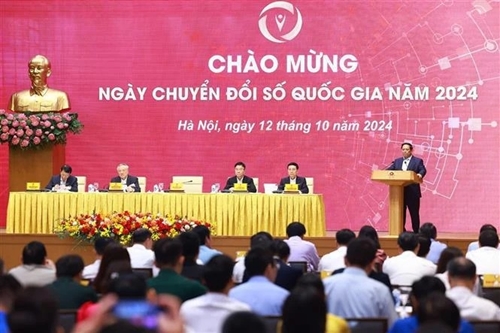Chairing an event to celebrate the National Digital Transformation Day 2024 held at the Government headquarters and connected online with 63 provinces and cities, Chinh, who is Chairman of the National Committee for Digital Transformation, emphasized that digital transformation is an inevitable trend, an objective requirement, a strategic choice and a top priority for rapid and sustainable development.
    |
 |
|
Prime Minister Pham Minh Chinh speaking at the event |
It is a mission of the entire Party, army, and people, contributing to the realization of the aspiration to build a strong and prosperous nation, where the people enjoy a wealthy and happy life, and no one is left behind, he stated.
The Government has identified the implementation of a "dual goal" of developing a digital government, digital economy, and digital society at a high level, and forming Vietnamese technology companies capable of competing globally, said Chinh.
He expressed his delight at the achievements of the national digital transformation which has had positive impacts on all socio-economic and cultural aspects and been appreciated by the international community.
Vietnam has made significant progress in international digital transformation rankings. In 2024, its e-government development index increased by 15 places, ranking 71st out of 193 countries and territories; the global innovation index rose by two places to 44th out of 133; and the global cybersecurity index improved by eight places to 17th out of 194.
Revenue from the digital technology industry in the first nine months of this year was estimated at 118 billion billion USD and that from software and digital services at 6.64 billion USD. The exports of digital technology products fetched 100.8 billion USD.
To have better digital transformation, the Government leader called for the completion of a digital legal framework for all matters related to the economy, civil transactions, production, and business, in alignment with improving the investment and business environment, reforming administrative procedures, reducing compliance costs, exempting or reducing taxes, fees, and charges, and promoting decentralization of authority.
He urged the early commercialization of 5G technology in several major cities to enhance the quality of digital services and promote modern production. He called for the upgrading of the national telecommunications infrastructure, diversifying connectivity methods, expanding international submarine cable connections, and developing satellite services to keep up with advanced countries in the region and around the world.
The PM highlighted the necessity to establish clean land reserves to create and build large-scale digital industrial centers for emerging sectors, attract investment resources, particularly foreign direct investment (FDI), to construct data centers, speed up construction to put the National Data Centre No. 1 into operation by the end of 2025, and soon establish national- and regional-level incident response centers for cybersecurity and information safety to protect national cyber sovereignty early and from afar.
Regarding human resources training, Chinh emphasized the need to diversify training methods, with focus on digital skills that align with market demands, and support national digital transformation and the development of the digital economy and society.
He also encouraged enhancing international cooperation in this field, and taking more measures to ensure security and safety during the digital transformation process, particularly in cyberspace.
Source: VNA